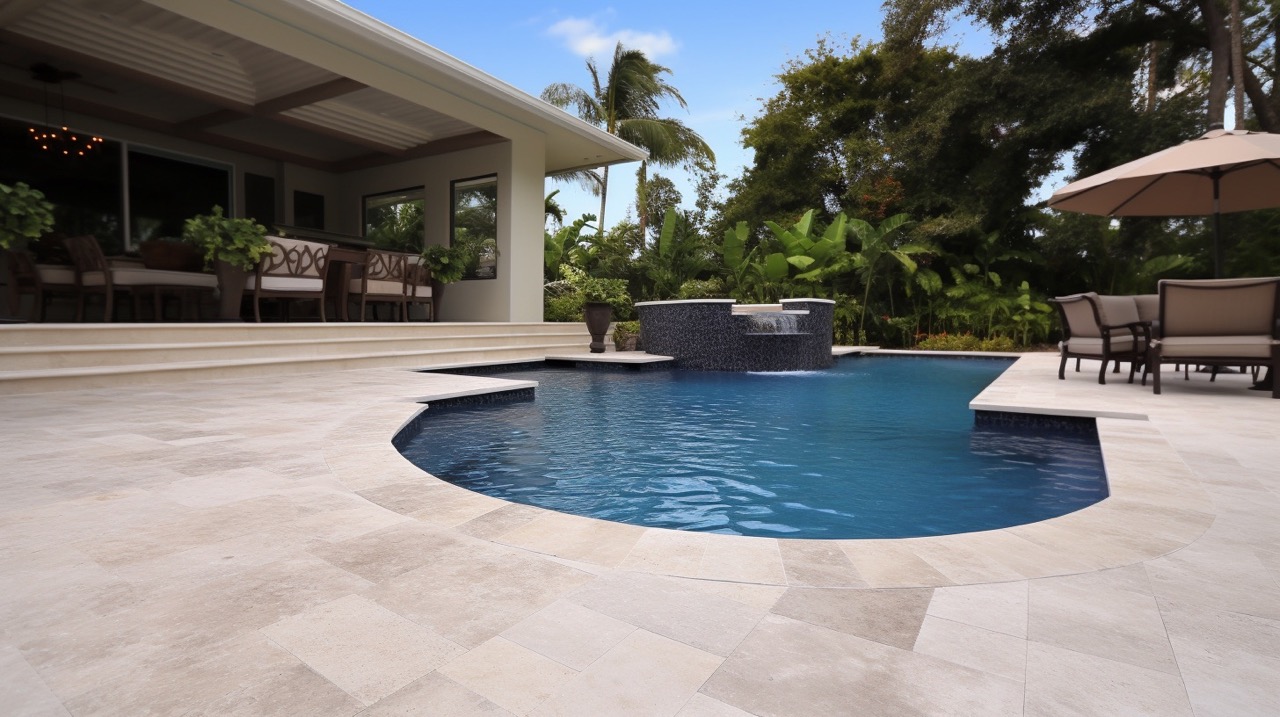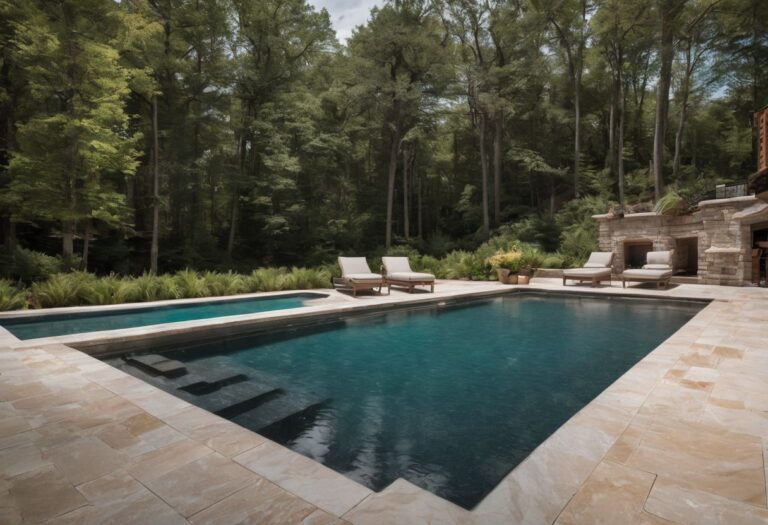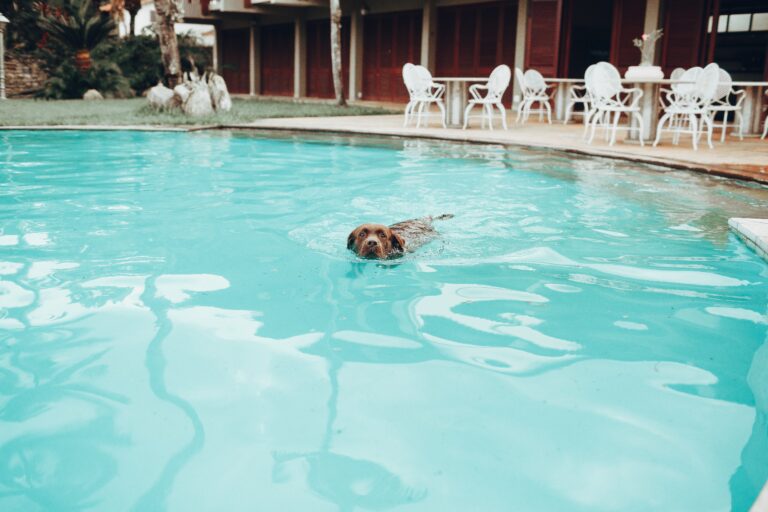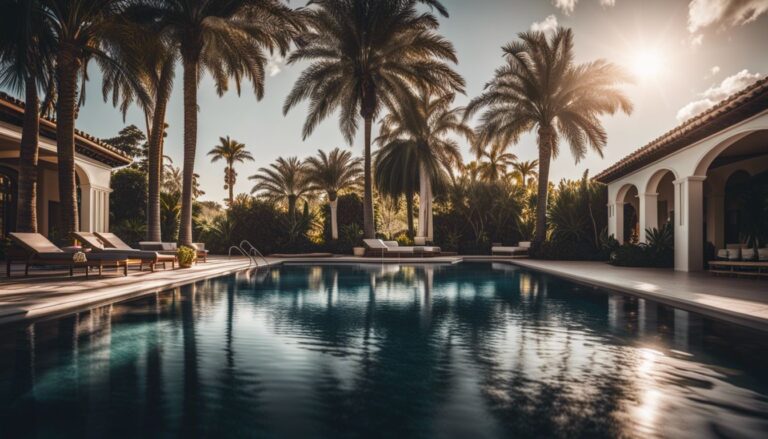How Long Does A Gunite Pool Last? Pros and Cons 2023
How Long Does A Gunite Pool Last
How long does a gunite pool last? It’s an important question when deciding between different types of in-ground pools. Gunite pools are known for their impressive durability and versatility, even if they may require regular maintenance.
The average lifespan of a properly built gunite pool is up to 100 years, which surpasses the estimated longevity of fiberglass or above-ground pools. In this blog post, we’ll look in-depth at all aspects of gunite pools and uncover answers to key questions like “How can I extend my gunite pool’s lifespan??”.
What is Gunite?
Gunite is a dry concrete mixture used to construct swimming pools and other water features. It requires pressure from an air compressor for proper installation, resulting in a strong, durable shell that can easily be shaped as desired.
This allows for custom designs and unique additions to any pool project. The gunite process also involves reinforcing steel rebar placed within the mixture during application before it undergoes an extensive curing process resulting in its rough finish.
Not only does this material offer superior strength, but it is low maintenance compared to many alternatives such as vinyl liner pools or fiberglass inground options meaning less chance of developing leaks over time while providing impressive customization potential to create one-of-a-kind shapes, sizes, and depths able to accommodate additional features like slides or hot tubs if desired.
With regular cleaning and maintenance via acid, washing resurfacing isn’t typically necessary until 8 to 12 years after installation due to gunite’s longevity, making it a popular choice domestically and for commercial projects across North America.
Pros and Cons of Gunite Pools
The benefits of installing a gunite pool include its impressive durability, versatile design options, and the fact that it does not require additional installation components such as wooden frames or vinyl liners.
However, they need regular maintenance to counteract their rough surface texture, which can lead to wear and tear over time.
Impressive durability
Gunite pools are one of the most durable, with an average lifespan of decades when properly maintained. Its unique material composition sets gunite apart from other in-ground pool types.
Constructed with a dry concrete mix and sand and cement sprayed on-site into the desired shape using a high-pressure hose, gunite shell forms as it hardens, creating a strong swimming pool surface.
The reinforcing steel rebar also contributes to this durability by preventing cracking during curing. This makes Gunite an ideal choice for those looking for reliable long-term performance out of their swimming pool investment without too much headache from regular maintenance requirements that come with many other types of pools.
Versatile design options
Gunite pools offer pool owners far more flexibility regarding design options than other types of inground pools. Gunite is a dry mixture of cement and sand, which can be molded into nearly any shape or size.
This makes it especially suitable for creating custom designs with luxurious features like built-in waterfalls, custom steps, hot tubs, swim-outs, and fountains—allowing homeowners to create their personalized backyard oasis.
The surface can also be plastered in virtually any color or texture desired, allowing for creative customization opportunities that you won’t get from other pool types, such as fiberglass.
How long does a gunite pool last? regular maintenance
Caring for a Gunite pool requires commitment and dedication from the owner. Although Gunite pools are very low-maintenance compared to other pools, regular upkeep is essential to maintain peak performance and maximize longevity.
Pool owners should get ahead of any issues by doing weekly checks on their water levels, pH level, alkalinity, and calcium hardness; filter maintenance such as replacing sand or DE filters regularly; brushing and vacuuming the gunite surface twice a week; skimming debris off the top of the water daily; adding algaecide every few weeks during swim season; checking pump strainers frequently for dirt or debris accumulation and keeping cartridges completely free at all times.
Regular inspections for signs of structural damage or wear can also help extend the lifespan of your gunite pool – these include fade spots due to age/bobbing(leaks), cracks in the plaster, rusting rebar, or visible gaps between caulking jobs that need replacement.
Comparison between Gunite and Fiberglass Pools
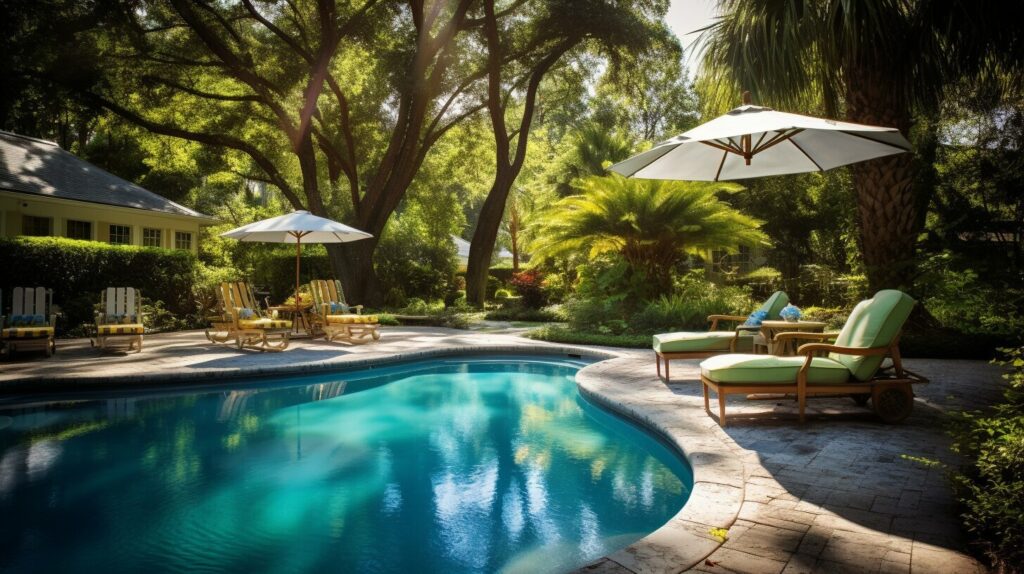
You may be torn between choosing a gunite or a fiberglass pool when installing a swimming pool. Both have their advantages and disadvantages. The below table provides a side-by-side comparison of these two popular pool types.
| Attributes | Gunite Pools | Fiberglass Pools |
|---|---|---|
| Installation Time | Weeks to months | A few days |
| Customization Options | Highly customizable in terms of size, shape, and design | Less customizable due to the requirement of pre-made molds |
| Lifespan | Approximately 50 years | Shorter than Gunite pools |
| Maintenance Requirements | Requires regular maintenance and resurfacing every 7 to 10 years | Easier to maintain and does not require frequent resurfacing |
| Cost | Generally more expensive | Cheaper than Gunite pools |
In summary, while gunite pools offer more customization options and have a longer lifespan, they take longer to install, require more maintenance, and are generally more expensive. On the other hand, fiberglass pools are quicker to install, easier to maintain, and less expensive, but they offer fewer customization options and have a shorter lifespan.
Average Lifespan of a Gunite Pool
Gunite pools offer an impressive lifespan when installed and maintained properly, typically lasting up to 100 years or more, with resurfacing needed every 15 to 30 years.
When designed and built properly, gunite pools can last for 100 years or more.
Gunite pools are considered one of the most durable, long-lasting options for swimming pools. The gunite material is mixed from dry concrete and shot onto a steel rebar frame with a high-pressure hose.
This construction method increases the durability of the pool and its resistance against external wear and tear, natural disasters, and more. Proper design can also be important in how well your pool retains its structural integrity over time.
A knowledgeable pool builder should be familiar with designing for increased longevity. Finally, regular maintenance like acid washing or resurfacing can also extend the lifespan of your gunite pool by many years.
Cosmetic renovations may be needed every 15 to 30 years
for gunite pools, such as replacing the waterline tile or resurfacing the pool. Properly built and maintained gunite concrete pools can last 100 years or more but may require cosmetic upgrades every 15 to 30 years to maintain their beauty.
Replacing tile on the water line is a common procedure that requires specialized installation and additional maintenance of chemical levels until it has cured properly. Resurfacing should be done every 7 to 10 years, with pool paint lasting only 2-5 years, while other high-end finishes may last up years longer with proper care and maintenance.
Other aspects of a gunite pool that may need updating are adding custom steps or special features like an electric heater or jets.

Signs it’s Time to Resurface a Gunite Pool
- Cracks beginning to form on the gunite pool surface, such as hairline fractures, are signs it’s time to resurface.
- Stains or discoloration developing on the pool can also indicate that it’s time to resurface.
- Another sign of needing resurfacing is a rough texture of the pool’s surface that has developed typically from exposure to sunlight and wear and tear over time.
- If you notice any signs of erosion around the edges, steps, corners or lighting outlets of your gunite pool, it may also be time for resurfacing.
- A need for regular acid washing can indicate damage to your gunite pool is getting worse and would need rebuilding or repair at some point.
- If sunlight has been beating down on one side of your gunite pool for an extended period, consider having it resurfaced due to potential uneven weathering and damage.
Caring for a Gunite Pool to Extend its Lifespan
- Proper maintenance is key to ensuring a gunite pool lasts; cleaning, filtering, and balancing the chemicals in the pool helps keep the water healthy.
- Inspect and maintain your pool regularly—look for any signs of damage or wear in the gunite shell.
- Use a low-pressure hose or pole brush to clean the pool’s interior walls and floor weekly.
- Backwash the filter every week or two to prevent clogs and ensure your pump operates efficiently.
- Test for pH levels in your water and adjust as needed to maintain safe swimming conditions.
- Balance alkalinity and calcium levels also help protect against corrosion of stair railings, ladders, liners, covers, etc., from acidic pool water.
- Clean the skimmer basket frequently to avoid dirty rails.
- Inspect all equipment, like pumps and filters, regularly for any damage or leakages.
- Invest in automatic cleaners as they help reduce the time it takes to clean and make maintenance easier by doing most of the work themselves.

Conclusion
Gunite pools are proven to be extremely durable and offer many versatile design options. Since a properly built gunite pool can last up to 100 years or more, occasionally resurfacing every 15-30 years, it is considered the best value among inground swimming pools.
Furthermore, proper maintenance and care can help prolong the lifespan of any swimming pool. Gunite pools require an initial investment but offer lasting rewards in quality and satisfaction that make them worth considering if you’re looking for a new pool—especially if you want a longer-lasting pool option than fiberglass.
FAQs
How long does a gunite pool typically last?
A gunite pool is designed to last for many years. Depending on the location, climate, and how it’s taken care of, a properly maintained gunite pool can be expected to have 20-30 years before renovation is needed.
What factors could reduce the longevity of my gunite pool?
Several factors may contribute to decreasing the life expectancy of your Gunite swimming pools, such as improper maintenance practices, ignorance towards balancing water chemistry levels, or not implementing suitable countermeasures that protect against physical damage caused by extreme environmental conditions over time (i.e., freezing temperatures).
Are there any warranties available for gunite pools?
Yes; depending on what contractor you hire for installation -customers may receive up to 10-year limited warranties, which cover structural defects with components used during assembly/construction phases (including pumps & plumbing systems).
What makes a gunite pool a good option compared to other types of pools?
A gunite pool is often considered the best option due to its durability and flexibility in terms of design. Unlike vinyl pool liners or fiberglass in-ground pools, a gunite pool can be custom-built to any size and shape, making it one of the most popular options in the United States.
How does the construction process for a gunite pool differ from other in-ground pool options?
The construction process for a gunite pool is unique and involves different materials. It begins with construction crews digging a hole in the desired shape of the pool, installing a wooden frame for support, and setting up the main drain and pool equipment.
The shell of the pool is then formed by spraying a mix of concrete material and sand onto a rebar framework.
How long does it take to construct a gunite pool?
The time to construct a gunite pool can vary based on the pool design, size, and any extra features. However, the entire process typically takes between 2-3 months. This includes time for the initial excavation, setting up the wooden frame, applying the gunite, and allowing it to cure, followed by applying the pool plaster for a smooth finish and final inspections to ensure everything is in order.
How often will my gunite pool need resurfacing?
The smooth surface of a gunite pool can last a long time with proper maintenance. However, depending on the variety of finishes used and the conditions the pool is exposed to, resurfacing may be required every 10 to 15 years. Regular pool resurfacing is essential to maintaining the longevity of your pool and ensuring a pleasant swimming experience.
How much does a gunite pool cost?
The cost of a gunite pool can vary widely based on several factors, including the pool size measured (square feet), the depth, the finish used, and additional features like pool decking or water features. It’s best to discuss your unique needs and budget with a professional pool builder for a more accurate estimate.
Is a building permit required for gunite pool construction?
Yes, a building permit is generally required for gunite pool construction. The specifics can vary depending on the local regulations in your area, so it’s best to check with local authorities or your pool contractor to understand the requirements.
Can a gunite pool be built at any time of year?
While gunite pool construction can technically be done at any time of year, certain seasons may be more favorable. Warm climates are usually ideal, as extreme cold can affect the curing process of the concrete material. The time of year can also impact the construction timeline, so it’s best to plan accordingly.
.
